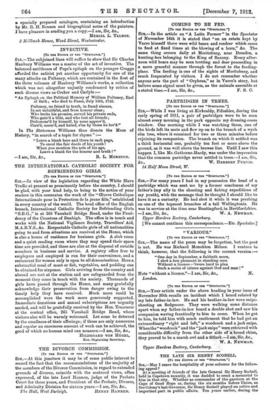INVECTIVE.
[TO THE EDITOR OF THE " SPECTATOR."]
Sin,—The subjoined lines will suffice to show that Sir Charles Hanbury Williams was a master of the art of invective. The balanced antitheses of Pope's epitaph on the younger Craggs afforded the satirist yet another opportunity for one of the many attacks on Pulteney, which are contained in the first of the three volumes of Hanbury Williams's works, a collection which was not altogether unjustly condemned by critics of such diverse views as Croker and Carlyle :—
•• An Epitaph on the Political Memory of William Pulteney, Earl of Bath ; who died to Fame, July 15th, 1742.
Pulteney, no friend to truth, in fraud sincere, In act unfaithful, and from honour clear; Who broke his promise, served his private ends, Who gain'd a title, and who lost all friends ; Dishonour'd by himself, by none approv'd, Cars'd, scorn'd, and hated, e'en by those he lov'd."
In The Statesman Williams thus directs the Muse of History, "in search of a topic for rhyme " :—
"Leave a blank here and there in each page, To enrol the fair deeds of his youth ! When you mention the acts of his age, Leave a blank for the honour and truth !"






































































 Previous page
Previous page